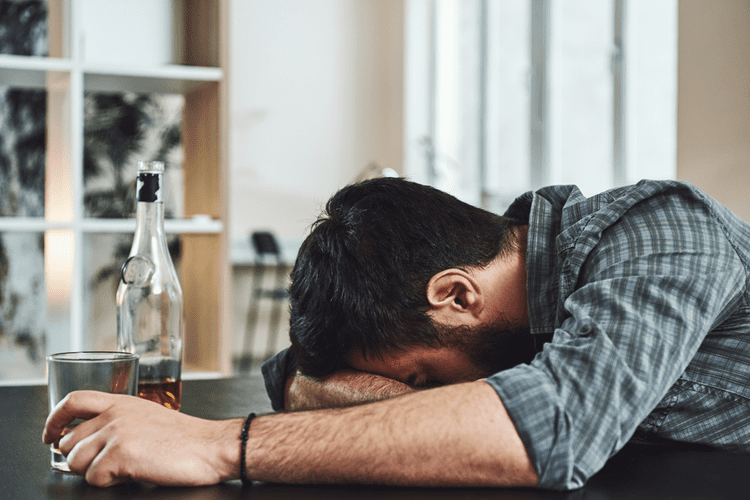People who consume alcohol before bed don’t wake up as often during the first few hours of sleep. But even if you thud into dreamland, there’s a good chance that too much alcohol will mean a fitful night of sleep. That’s because alcohol disrupts what’s known as your sleep architecture, the normal phases of deeper and lighter sleep we go through every night. A night of drinking can “fragment,” or interrupt, these patterns, experts say, and you may wake up several times as you ricochet through the usual stages of sleep. Researchers have noted a link between long-term alcohol abuse and chronic sleep problems. People can develop a tolerance for alcohol rather quickly, leading them to drink more before bed in order to initiate sleep.
If you don’t have an existing case of OSA, drinking even a small amount before bed can cause this issue. Some people may assume alcohol is helpful for sleep, since it has a relaxing, soporific effect. Consuming alcohol can help a person fall asleep because alcohol is a depressant. As alcohol enters the bloodstream, it introduces chloride ions to neurons, slowing the neurons’ firing. However, people tend to quickly develop a tolerance to alcohol’s sedative effects, so if you drink regularly, you may not feel sleepy unless you drink to excess. Reducing your alcohol intake, especially in the hours leading up to your bedtime, can help you wake up well-rested and energized in the morning.
hours
Below, we’ll take a closer look at how alcohol affects the different stages of sleep, as well as how the quantity and timing of alcohol can influence sleep quality. Alcohol may be consumed in beer, wine, and hard liquors like vodka, rum, gin, and whiskey. It is more often consumed at night, also called a nightcap, and may negatively affect your sleep. While alcohol can make you feel tired at first, it can also disturb your sleep as it wears off. If you’re struggling to get enough quality rest, talk to a health care professional about ways to improve your sleep.
Alcohol has sedative effects that can induce feelings of relaxation and sleepiness, but the consumption of alcohol — especially in excess — has been linked to poor sleep quality and duration. People with alcohol use disorders commonly experience insomnia symptoms. Studies have shown that alcohol use can exacerbate the symptoms of sleep apnea. Since alcohol adversely affects a person’s sleep quality, they’re likely to feel fatigued during the day, leading them to drink coffee or energy drinks to stay awake and sedate themselves with alcohol at night. These people will likely find they have to drink more and more as time goes by to overcome the tolerance they have built up to alcohol’s sedative effects.
Sedative effects of alcohol
Alcohol does indeed reduce sleep latency at all doses — in other words, you’re likely to fall asleep faster after a drink. Moreover, you’re likely to get more «deep sleep,» which is the period during which your body repairs and regenerates. While many previous studies have been done on the topic, researchers in this review restricted their analysis to studies of healthy people who were tested in a sleep lab during the night. The review was meant to clarify the «state of the science» regarding alcohol’s effects on healthy people, the researchers said. Researchers analyzed information from 20 previously published studies that looked at the effects of alcohol on sleep.

Suppressing this hormone can cause your kidneys to release more water than they otherwise would. In severe instances, this can lead to dehydration, does alcohol help you sleep leaving you with nausea and a headache. When this phenomenon occurs, you must drink a lot of water to rehydrate your body.
Weeknight Dinner Ideas to Kickstart a Healthy 2024
This can lead to excessive daytime sleepiness and other issues the following day. Drinking to fall asleep can build a tolerance, forcing you to consume more alcohol each successive https://ecosoberhouse.com/ night in order to experience the sedative effects. Drinking negatively affects sleep, and naturally, this affects your mood and energy levels the following day.
However, consuming alcohol can also cause sleep disruption and other adverse effects on people’s health. An estimated 20% to 30% of people report drinking to manage insomnia.7 While alcohol can initially cause sedation, over time, alcohol causes major disruptions in the quality of sleep. In a 2011 study published in the journal Alcoholism, Clinical and Experimental Research, men and women consumed the same amount of alcohol before going to bed. Although the results were self-reported, women said they felt more tired before bed, experienced more nighttime awakenings and recorded less sleep than their male counterparts. REM sleep is vital for healthy brain development, the National Sleep Foundation noted.
